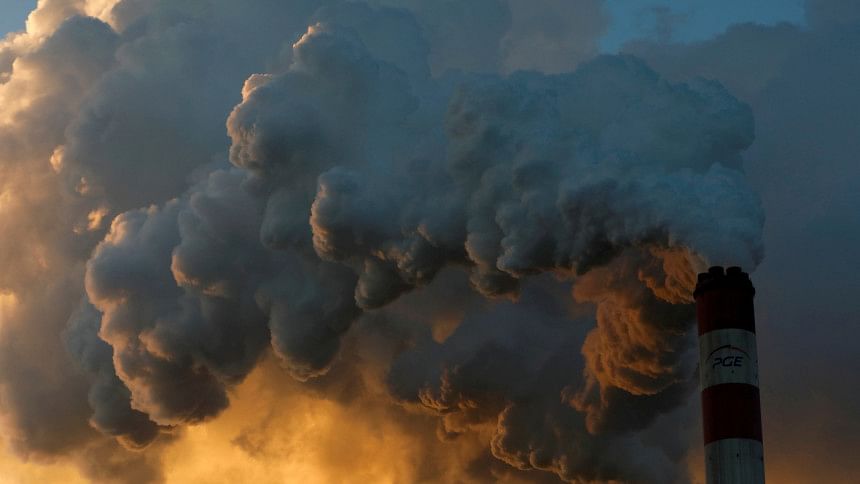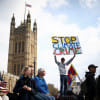The role that the financial sector can play to combat climate change

Earth Day has been celebrated on April 22 since 1970 on a proposal by US Senator Gaylord Nelson to increase environmental awareness. On this day in 1970, about 20 million people in the United States came out and protested vehemently against environmental pollution. The day has been celebrated globally since 1990.
The theme for this year is "Our Power, Our Planet" through which everyone around the world is being called upon to unite behind the production of renewable energy and triple global production of renewable energy by 2030. This will make it easier to ensure global energy security.
The world is facing serious impact of climate change mainly due to the continuous increase in the density of carbon dioxide in the atmosphere. In 1974, the density of carbon dioxide in the atmosphere was 330.19 parts per million (ppm), which in 50 years has increased to 424.61 ppm. In fact, 2024 has been marked as the warmest year on record due to abrupt climate change. This year, the temperature in the atmosphere was about 1.55 degrees Celsius higher than the pre-industrial revolution.
According to a World Bank report, about 1.2 billion people in the world are at high risk of climate change but rapid development and sustainable economic growth can reduce the economic and quality of life losses caused by climate change.
The report found a 10 percent increase in per capita GDP would reduce the number of the most vulnerable by about 100 million. Therefore, increasing per capita income is crucial at this time.
In addition, about 129 countries, including Bangladesh, have prepared their own National Adaptation Plan (NAP) in 2022 for UNFCCC under the NAP Global Network to overcome the damage caused by climate change.
NAP divided Bangladesh into 11 climate zones and identified a total of 14 risks, it has proposed 110 actions to implement six main goals, where a total of $230 billion in climate assistance is needed till 2050 to address these risks. Bangladesh is among the top ten countries in the world that are most at risk from climate change. In this situation, World Earth Day provides us with an opportunity to make a new commitment related to the Multilateral Green Climate Fund to mitigate climate risks and impacts.
A 2024 report estimated that climate finance flows would need to increase at least six-fold reaching $8.5 trillion per year by 2030.
A special climate change fund was created in 2001 to help vulnerable countries cope with the negative effects of climate change. Subsequently, more effective action by all parties are required to implement the terms of 'Kyoto Protocol' to reduce greenhouse gas emissions, which has become urgent. Unfortunately, some developed countries withdrew from the agreement, the US did not ratify while others did not sign the second targets round of targets of the protocol. As a result, the affected countries are struggling a lot to get the compensation.
However, in 2024, the World Bank Group provided $42.6 billion in climate finance. Bangladesh has received $1.16 billion in financial assistance from the World Bank to promote healthcare, water and sanitation, and climate resilience. This includes a $500 million Green and Climate Resilient Development Loan. In addition, other lenders are also allocating a significant portion of their funds to support Bangladesh's climate agenda.
Local banks can be more proactive in lending to renewable energy, environmentally friendly industries, green buildings, and agriculture-based sustainable projects, helping to reduce carbon emissions. According to the Bangladesh Bank report, the combined contribution of the country's 61 banks and 34 NBFIs to sustainable finance in the second quarter of 2024 was Tk 1.16 trillion, which is Tk 281.03 billion more than in the first quarter. In the second quarter of 2024, banks invested Tk 1.13 trillion and NBFIs invested Tk 29.92 billion in sustainable finance.
A directive issued by Bangladesh Bank in November last year stated that from 2025, banks will invest 40 percent of their total loans in the private sector for environmentally friendly and sustainable initiatives of which five percent must go to environmentally friendly initiatives.
Meanwhile, several banks in Bangladesh continued to pave the way forward to environmental conservation by increasing customer awareness, expanding paperless banking, and revolutionising digital transactions. However, every workplace should adopt policies that reduce unnecessarily interference with our environment.
Protecting nature and the environment and creating a green world has been essential through more responsible behaviour of the developed world countries, a strong role of the financial sector, and widespread awareness among the people. Everyone must join the fight for survival and stand against the destruction of nature and the environment to combat the negative effects of climate change.
M M Mahbub Hasan is the head of financial inclusion and school banking at Prime Bank PLC. He can be reached at [email protected].
Views expressed in this article are the author's own.
Follow The Daily Star Opinion on Facebook for the latest opinions, commentaries and analyses by experts and professionals. To contribute your article or letter to The Daily Star Opinion, see our guidelines for submission.

 For all latest news, follow The Daily Star's Google News channel.
For all latest news, follow The Daily Star's Google News channel. 










Comments